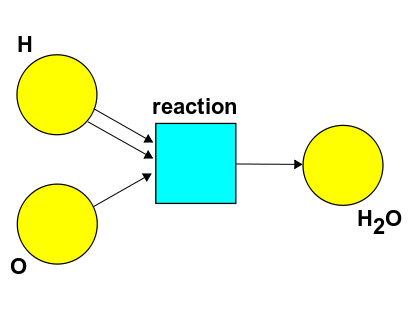Since I was about four years old and first started to play with matches I have been a pyromaniac. Not a crazy one who burns down buildings but more of a scientific pyromaniac who builds foundries and smelters and just enjoys a good backyard bonfire.
When I first started being interested in fire I could never understand why water isn’t flammable. I put flaming matches, candles and pieces of paper into buckets of water and over many trials I found the data to be conclusive: water definitely isn’t flammable. At that time I was only curious because everything else seemed to be pretty flammable but water was the only thing I tried to light that didn’t catch or even blacken in the flame.
As I got older and learned that water was made of Hydrogen and Oxygen, the fact that water wouldn’t catch flame made even less sense to me.
(Red are oxygen white are hydrogen)
Now that I am in high school Chemistry I know that Oxygen has 6 valence electrons and Hydrogen has 1, so two Hydrogen atoms want to bond with an Oxygen atom to reach a stable octet: when there are 8 valence electrons. If not bonded Hydrogen and Oxygen together are flammable…very very very flammable… As in flammable enough to be the fuel for some rocket ships.
( Image Right)
The way I think of it is that the statement, “if not bonded Hydrogen and Oxygen together are flammable” gives away the reason why water isn’t flammable. Water is the product of hydrogen and oxygen burning. Try sticking a match into a pile of dry ash and it will go out. Stick a match into water and it will go out. Water is basically ash! It is the product of burning so it cannot burn more and more importantly it has reached a stable octet and has 8 total valence electrons and CANNOT accept anymore.
In fire, molecules or atoms are combining with oxygen to form new compounds. Water cannot combine with oxygen because water is already stable and does not want to bond to anything else.
As shown in the excellent image above, water has charged ends. The hydrogen are positive because they gave away their one electron to bond to oxygen and now have more protons. The oxygen is negative because it gained two electrons from the hydrogen so the oxygen has more electrons than protons and is negative. These charges give water some of the characteristics that make life possible: adhesion and cohesion. I think one day all cars should run on water, but that’s an idea for another post so I’ll leave my reader curious for one more week.






I happen to share your obsession with fire, Gabe. I didn't learn how to light a match until a couple years ago, but ever since then, I've been hooked by this strange phenomenon of nature. Like you, I often did several of the same experimentations with fire. Lighting up random things has always just been strangely appealing. Once I began chemistry this year, I also wondered about the mechanics as to why some things lit up and not others, especially water. The science behind it is fascinating but have you wondered what other substances have the same effect as water, besides ash? Or perhaps, what substances do just the opposite: blow the fire out of proportion? Maybe that can be examined in a later post. However, I am also intrigued by the question you left us readers lingering with: cars running on water. This may already be a possibility in Japan...Here's a closer look: http://www.youtube.com/watch?v=CrxfMz2eDME
ReplyDelete